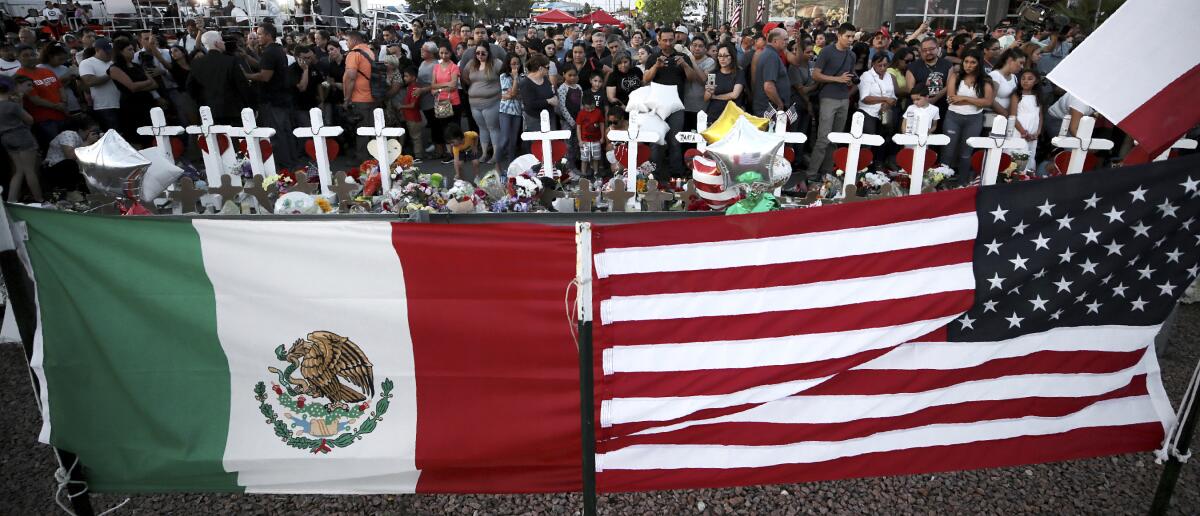Newsletter: How quickly a mass shooting is old news

- Share via
Good morning. I’m Paul Thornton, and it is Saturday, Aug. 10, 2019. Pardon me for beginning with a personal tale, but it bears on a matter of substantial public interest.
On Friday, while dropping two of my children off for their first day of school (so much for classes beginning after Labor Day), I noticed all the flags that normally fly high enough on their poles to catch a breeze and flap proudly were drooping at half staff. This isn’t an uncommon occurrence, and sadly, neither was the reason they were hoisted low: In the last two weeks, more than 30 people have been killed in mass shootings. It’s unsettling to be reminded of this fact when surrendering your children to the care of their teachers for another school year, but that’s life in America nowadays.
The L.A. Times editorial board has had several chances to ruminate on what it means to live in a country that tolerates regular mass shootings. Time was when the death of three people jarred us enough to pen a staff editorial lamenting the proliferation of guns and gun violence in America. That was less than two weeks ago in response to the shooting in Gilroy. Less than a week later, the editorial board reacted to another massacre, this one in El Paso. Less than 24 hours after that, editorial writer Scott Martelle reacted to the killing of nine people in Dayton, Ohio.
You can guess what drove much of our coverage in Opinion this week. My only hope is that by the time this newsletter lands in your mailbox, it isn’t obsolete because of another massacre somewhere else.
There are four things nearly every mass shooter has had in common since 1966. Those commonalities, according to criminologists Jillian Peterson and James Densley, are early childhood trauma and exposure to violence at a young age, a personal crisis in the weeks or months leading up to the shooting, a fascination with previous mass killers and the means to carry out their plans. L.A. Times
White supremacy is the poison in America’s well. Police said the accused El Paso killer told them he was targeting Mexicans, and an online manifesto linked to him expresses violently anti-immigrant views — views that sound somewhat similar to those articulated by President Trump. The editorial board believes the president was right to condemn bigotry and specifically white supremacists in his address to the nation on Monday, but it has some advice for him: “The president should start with himself. He has called Mexicans and other immigrants ‘thugs’ and ‘animals’ who are invading the U.S., disparaged much of the Third World as ‘shithole countries,’ characterized some of those supporting a neo-Nazi rally in Virginia that turned fatal as ‘very fine people,’and just recently described sections of Baltimore as so blighted that ‘no human being would want to live there.’ Those kinds of nasty and divisive statements help create a climate and culture in which racist extremism can thrive.” L.A. Times
8chan breeds mass shooters, and it’s probably here to stay. The internet platform — which, among other things, hosts anonymous racist screeds like the one alleged to have been posted by the accused El Paso shooter — is coming under intense scrutiny, and companies that help host its content are well within their right to try to disable it. But any disruption in service is likely to be temporary, writes Jon Healey. L.A. Times
American culture is sick, and neither liberals nor conservatives have the cure. Columnist Jonah Goldberg believes that the far left and the far right are both pursuing increased nationalization in their own different ways, and formerly tight-knit communities are becoming unwoven because of it. That, he says, has led to a crisis of loneliness, evidence for which is provided in surveys that show many millennials report having no friends. “Government has a role in dealing with the challenges of globalization and automation, but these movements cannot fill the holes in our souls,” Goldberg writes. L.A. Times
California farmers are already living a global warming nightmare. The United Nations released a report this week warning of the effect of climate change on the world’s food supply, but according to San Joaquin Valley farmer Alan Sano, the people in his region who grow much of this country’s produce don’t need another report. Water for irrigation is growing more scarce, summer temperatures are abnormally high, the region’s tule fog is disappearing, and winters are getting warmer, Sano writes. New York Times
She doesn’t like Trump, but she loves Equinox. So does she give up her gym membership? Carla Hall wrestles with this question following the revelation that billionaire Stephen Ross, the majority owner of the company that controls Equinox and SoulCycle, is a major fundraiser for the president. Hall says she doesn’t need to quit, and here’s why: “It’s awfully difficult to disentangle your life from businesses and services you like that are run by people whose politics you hate. It’s even difficult to disentangle your personal relationships.” L.A. Times
Reach me: Paul.Thornton@latimes.com
More to Read
A cure for the common opinion
Get thought-provoking perspectives with our weekly newsletter.
You may occasionally receive promotional content from the Los Angeles Times.







